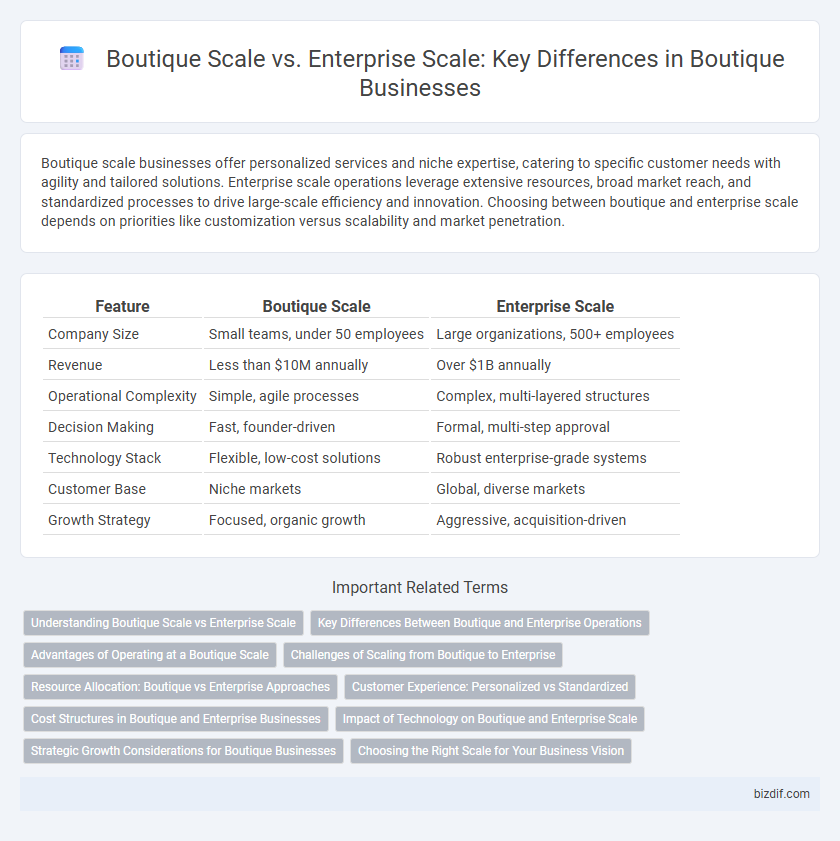Boutique scale businesses offer personalized services and niche expertise, catering to specific customer needs with agility and tailored solutions. Enterprise scale operations leverage extensive resources, broad market reach, and standardized processes to drive large-scale efficiency and innovation. Choosing between boutique and enterprise scale depends on priorities like customization versus scalability and market penetration.
Table of Comparison
| Feature | Boutique Scale | Enterprise Scale |
|---|---|---|
| Company Size | Small teams, under 50 employees | Large organizations, 500+ employees |
| Revenue | Less than $10M annually | Over $1B annually |
| Operational Complexity | Simple, agile processes | Complex, multi-layered structures |
| Decision Making | Fast, founder-driven | Formal, multi-step approval |
| Technology Stack | Flexible, low-cost solutions | Robust enterprise-grade systems |
| Customer Base | Niche markets | Global, diverse markets |
| Growth Strategy | Focused, organic growth | Aggressive, acquisition-driven |
Understanding Boutique Scale vs Enterprise Scale
Boutique scale businesses emphasize personalized service, niche market expertise, and agile operations, often with a smaller team and tailored offerings. Enterprise scale organizations operate with extensive resources, large-scale infrastructure, and broad market reach, prioritizing standardized processes and high-volume transactions. Understanding these distinctions helps align business strategy with appropriate customer engagement, operational efficiency, and growth potential.
Key Differences Between Boutique and Enterprise Operations
Boutique operations prioritize personalized service, niche market expertise, and smaller, highly skilled teams, enabling agility and tailored client experiences. Enterprise scale operations emphasize extensive resource allocation, standardized processes, and broad market reach, supporting high-volume transactions and global scalability. Key differences include the level of customization, operational complexity, and the scale of client management.
Advantages of Operating at a Boutique Scale
Operating at a boutique scale allows businesses to offer highly personalized customer experiences and tailor products or services to niche markets, resulting in stronger client relationships and increased brand loyalty. The agility of boutique firms enables faster decision-making and adaptation to market changes compared to enterprise-scale operations, which often face bureaucratic delays. Limited overhead costs and focused resource allocation further enhance profitability and operational efficiency in boutique businesses.
Challenges of Scaling from Boutique to Enterprise
Scaling from a boutique to an enterprise scale involves challenges such as maintaining personalized customer service while managing increased operational complexity and higher volume demands. Boutiques often struggle with integrating advanced technological systems and standardized processes required for enterprise efficiency. Ensuring consistent brand identity and employee culture during rapid expansion can further complicate sustainable growth.
Resource Allocation: Boutique vs Enterprise Approaches
Boutique businesses allocate resources with a focus on personalized service and high specialization, often investing heavily in skilled talent and niche technologies that support bespoke offerings. Enterprise-scale companies distribute resources across extensive departments, leveraging economies of scale to optimize operational efficiency and large-scale production capabilities. Resource allocation in boutiques emphasizes quality and customization, while enterprises prioritize scalability and standardized processes.
Customer Experience: Personalized vs Standardized
Boutique scale businesses excel in delivering personalized customer experiences by tailoring services and products to individual preferences, fostering strong client relationships. Enterprise scale companies often implement standardized customer experiences to maintain consistency and efficiency across a broad customer base. Personalized experiences in boutique settings enhance customer loyalty, while standardized approaches in enterprises optimize operational scalability.
Cost Structures in Boutique and Enterprise Businesses
Boutique businesses typically have lower fixed costs due to smaller office spaces, limited staff, and personalized service models, allowing for greater flexibility in pricing and operational expenses. Enterprise-scale businesses face higher fixed and variable costs driven by extensive infrastructure, large workforce, and complex supply chains, resulting in significant economies of scale but also increased overhead. Cost structures in boutiques emphasize agility and niche market focus, while enterprises rely on mass production efficiencies and substantial capital investments to maintain competitiveness.
Impact of Technology on Boutique and Enterprise Scale
Boutique firms leverage cutting-edge, specialized technology to offer highly personalized services, enhancing client engagement and operational agility. Enterprise-scale companies adopt large-scale, integrated technology platforms that support massive data processing, automation, and global connectivity, driving efficiency and consistency across extensive operations. The technological impact on boutiques fosters innovation and niche expertise, while enterprises benefit from scalability and robust infrastructure.
Strategic Growth Considerations for Boutique Businesses
Boutique businesses prioritize agility, personalized customer experiences, and niche market expertise when planning strategic growth, contrasting with enterprise-scale firms that emphasize economies of scale and broad market penetration. Growth strategies for boutique businesses often include targeted product development, deepening customer relationships, and leveraging specialized brand positioning to sustain competitive advantage. Strategic growth considerations must balance maintaining boutique exclusivity with scaling operations, ensuring that expansion efforts do not dilute the unique value propositions central to boutique success.
Choosing the Right Scale for Your Business Vision
Boutique scale businesses prioritize personalized services and niche expertise, enabling deep customer connections and tailored experiences that align closely with a focused business vision. Enterprise scale companies leverage extensive resources and broad market reach, ideal for visions centered on rapid growth, large-scale operations, and diversified product offerings. Selecting the right scale depends on whether your business prioritizes agility and customization or expansive growth and operational efficiency.
Boutique Scale vs Enterprise Scale Infographic

 bizdif.com
bizdif.com